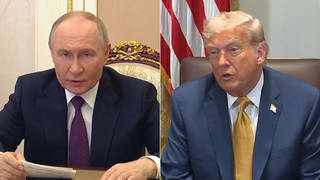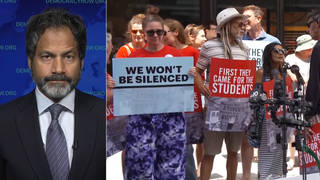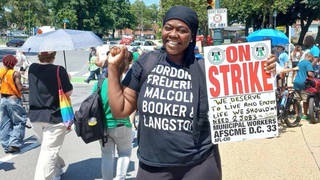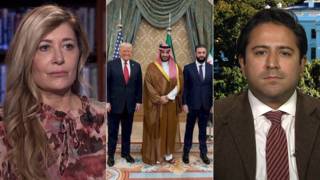
Topics
Guests
- Charles Glassformer ABC News chief Middle East correspondent. He spent 10 days in Syria last month. His book on Syria, Tribes with Flags, is being reissued this year. His most recent piece for the New York Review of Books is “Syria: The Citadel and the War.”
The United States and 11 other countries have formally expelled Syrian diplomats following a massacre of more than 100 people in the village of Houla. U.N.-Arab League envoy Kofi Annan now says Syria has reached a “tipping point” after more than a year of conflict. We’re joined by Charles Glass, an award-winning journalist, author and broadcaster specializing in the Middle East. Glass reported from Syria last month for the New York Review of Books. [includes rush transcript]
Transcript
NERMEEN SHAIKH: The U.S. and 11 other countries have formally expelled Syrian diplomats following a massacre of over a hundred people in the village of Taldou, near Houla. Dozens of children were killed in the Houla attack, which marked one of the deadliest single incidents of the 15-month uprising against Bashar al-Assad. In a coordinated action, countries including Germany, France, Britain, Canada and Japan ordered the departure of Syrian ambassadors from their capitals. In Washington, State Department spokesperson Victoria Nuland said Syria’s top diplomat in the U.S. has been told to leave within three days and also blamed Iran for the massacre.
VICTORIA NULAND: This morning, we called in Syrian chargé d’affaires Zuheir Jabbour and informed him that he is no longer welcome in the United States and gave him 72 hours to depart. We took this action in response to the massacre in the village of Houla—absolutely indefensible, vile, despicable massacre against innocent children, women shot at point-blank range by regime thugs, the Shabiha, aided and abetted by the Iranians, who were actually bragging about it over the weekend.
NERMEEN SHAIKH: That was State Department spokeswoman Victoria Nuland. Meanwhile, U.N.-Arab League envoy to Syria, Kofi Annan, has said the country has reached a, quote, “tipping point” after more than a year of conflict. On Tuesday, Kofi Annan made an emergency trip to Damascus and met with Syrian President Bashar al-Assad.
KOFI ANNAN: I shared with President Assad my assessment that the six-point plan is not being implemented as it must. We are at a tipping point. The Syrian people do not want a future, their future, to be one of bloodshed and division. Yet the killings continue, and the abuses are still with us today.
AMY GOODMAN: Earlier, U.N. human rights spokesperson Rupert Colville said initial investigations suggested most of those killed in the village of Taldou were summarily executed.
For more, we’re going to Charles Glass, award-winning journalist, author, broadcaster, specializing in the Middle East, just returned from Syria last month, joins us now from London. His most recent piece for the New York Review of Books is called “Syria: The Citadel and the War.”
Charles Glass, welcome to Democracy Now! Can you respond to the latest in Syria and then talk about what people were saying in Aleppo and Damascus, where you’ve just returned from?
CHARLES GLASS: Well, I think the massacre at Houla and in Taldou, massacres in those places, are a clear indication of how urgent it is to find—to force both sides in the conflict, the opposition and the regime, to negotiate a settlement, which would ultimately probably mean a change of regime, but certainly a transition. In the absence of that, you will have the Russians arming the government; you’ll have the Saudis, the Qataris, possibly the United States to Turkey, arming the opposition, which can only exacerbate the civil war. And as we remember from civil wars in Iraq and Lebanon, more massacres will then take place. This was the biggest fear amongst people that I spoke to in both Damascus and Aleppo. And it’s a big fear that most of the minorities—remember that Syria is a country composed of many minorities— Christians, Yazidis, Kurds, Armenians and others—and those minorities are terribly afraid of massacres that might take place if the conflict escalates.
NERMEEN SHAIKH: Charles Glass, who are the Shabiha militiamen who were allegedly responsible for this massacre?
CHARLES GLASS: “Shabiha” is an Arabic term that means roughly “ghost.” It also means someone who disguises himself. Initially, the Shabiha were small-time gangsters in the port areas around Latakia. They are occasionally called upon to do favors for the Alawites of the regime. And some of those favors involve being at checkpoints with soldiers, being at checkpoints with the police. They will go into people’s houses, as they did in Homs, and commit murders. They will intimidate people. They are above—clearly above the law. And if they were, indeed, as everyone suspects, involved in the massacres in Houla and Taldou, then they should be held responsible.
One of the things that happened very early in the uprising in Syria, which began with demonstrations by students in the southern town of Daraa, was that the governor of Daraa was responsible for the torture of children who were arrested during the demonstrations and after the demonstrations. And because Bashar al-Assad did not arrest the governor, who is a relation of his, immediately, a lot of people who believed that Bashar al-Assad could be a reformer lost their faith in him. There are still some people—many people—in Syria who support the regime, but if he doesn’t do something about this and doesn’t bring those responsible to account, I think he’ll lose even more support.
NERMEEN SHAIKH: Well, Russian Foreign Minister Sergey Lavrov, speaking yesterday, said that certain countries were using this massacre, the Houla massacre, as, quote, “a pretext for voicing demands relating to the need for military measures to be taken.” And one of the things that you point out in your article is that the majority of people you spoke to in Aleppo and Damascus are opposed to any kind of military intervention in the conflict.
CHARLES GLASS: Well, they all remember what happened when the United States invaded Iraq, and they don’t want that kind of chaos. They don’t want a total destruction of the state and then a prolonged civil war with the ethnic and sectarian cleansings that they saw in Iraq. Remember, they received over two million refugees from Iraq who were fleeing the chaos that came after the American invasion. They don’t want to be subject to that themselves. And surely, those who use the massacre as a justification to call for Western air strikes or Western invasion should think that actually this massacre should be a reminder of what could happen not only without an invasion, but because of an invasion. And that makes it all the more urgent for pressure to come from Russia on the government and from the West and Saudi Arabia and Qatar on the opposition to sit down and hammer out binding agreements that will end this conflict before it destroys the country.
AMY GOODMAN: U.S. General Martin Dempsey, the chair of the Joint Chiefs of Staff, discussed the possible military intervention in Syria during an interview on Fox.
GEN. MARTIN DEMPSEY: There is always a military option, but that military option should always be wielded carefully, because, one thing we’ve learned about war, I have learned personally about war, is that it has a dynamic all its own, it takes on a life all its own. And so, you’ll always find military leaders to be somewhat cautious about the use of force, because we’re never entirely sure what comes out on the other side. But that said, it may come to a point with Syria because of the atrocities.
AMY GOODMAN: That was General Dempsey. Charles Glass, your response?
CHARLES GLASS: Well, the general makes a good point, that you can’t predict the outcome of an invasion. I think one of the outcomes is that it might unite a lot of the Syrian people against an invasion. Syria has a very long history of fighting foreigners when they came in. When the French invaded in 1920 and kept the country under a French mandate from 1920 to 1945, they fought and rebelled almost every year. Large sections of Damascus and other cities in Syria were destroyed by French artillery in order to keep French rule. And they haven’t forgotten. They haven’t forgotten that. And they still feel very strongly Arab, very strongly Syrian, and want to preserve their sovereignty. And a Western invasion is very much feared.
And even more than a Western invasion, a Turkish invasion is feared. I spoke to many Armenians in Aleppo. There’s a large Armenian community in Aleppo. And they remember the Armenian massacres of the First World War, and they do not want to see Armenian troops coming in, nor do the Kurds of northeast Syria want to see the Turks coming in, because the Turkish record on treatment of Kurds in Turkey is appalling.
NERMEEN SHAIKH: Well, earlier this year, Democracy Now! spoke to Karam Nachar. He is a cyber activist working with Syrian protesters via social media platforms. He has advocated for international intervention.
KARAM NACHAR: While I do realize that liberals around the world, in particular, are very wary of a replication of the Iraq scenario, for instance, the world, I think, should know that this is not Iraq. This is a society that has been mobilizing against the regime for the past year. There is a humanitarian disaster unfolding on the ground. There’s a moral responsibility to protect the Syrian people. This is not a perfect situation. It’s complicated. It’s going to require a lot of money and a lot of courage and a lot of involvement on the part of the international community.
NERMEEN SHAIKH: Charles Glass, your comments on what Karam Nachar had to say?
CHARLES GLASS: Mr. Nachar has every right to call for help from any corner he can, because people are being killed in Syria. But those who are contemplating being the intervenors should think very carefully about the consequences of their actions. As the general said, you can’t predict what that outcome will be. It will certainly raise the stakes. The Syrian army is not an entirely demoralized army the way the Iraqi army was after 15 years of sanctions and after losing wars in Kuwait and Iran. The Syrian army is well armed, well supported by the Russians. And it could lead to very serious—very serious—disputes between the United States and Russia along the lines that we can recall from the Cold War. I don’t know that anyone wants to go back to that, especially now when there is the chance—with so much leverage from the West and from Russia on the two sides, there is the chance to force them to meet and to talk about a way of solving this peacefully.
AMY GOODMAN: And what do you envision that pressure to look like? And particularly talk about the role of Russia, that has sided with Syria, but also cited constantly how it felt betrayed around the U.S.-NATO intervention in Libya.
CHARLES GLASS: Russia has its own interests in the region. It also fears a Salafist uprising in Syria, much as it did in Chechnya. Whether that’s a pretext or genuine is very difficult to say. But the Russians have—because they arm the Syrian regime, and they’re the only ones arming them with the weapons that they need, they could cut that supply, or threaten to cut that supply, if the regime doesn’t come to the table. Similarly, the West and Saudi Arabia and Qatar could threaten to cut off all aid to the opponents if they don’t come to the table.
AMY GOODMAN: Charles Glass, very quickly, Iran? We have 10 seconds. The U.S. is blaming Iran for what’s going on in Syria.
CHARLES GLASS: Well, I think Iran could blame the U.S. for what’s going on in Syria, in the sense that the reason most of the outside powers turned against the regime was not because of its human rights violations, which the U.S. tolerated for years when the CIA used to render suspects to Syria. The reason that they don’t like the regime anymore is because it has had this close relationship with Iran.
AMY GOODMAN: Charles Glass, I want to thank you for being with us, former ABC News chief Middle East correspondent, spent 10 days in Syria, in Damascus and Aleppo.













Media Options